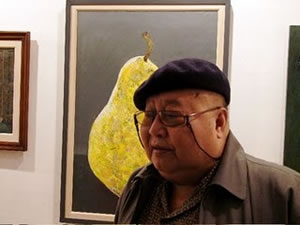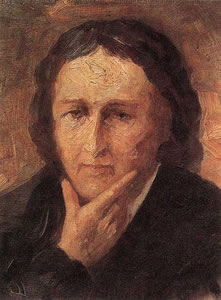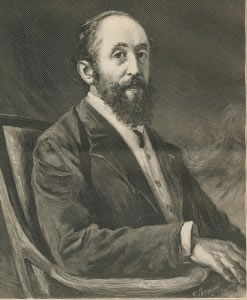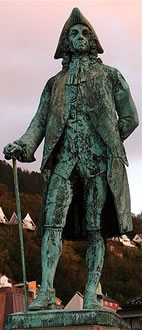De Duitse dichter, folkzanger en jurist Franz Josef Degenhardt werd geboren op 3 december 1931 in Schwelm. Franz Josef Degenhardtoverleedop 14 november van dit jaar op 79-jarige leeftijd. Zie ook mijn blog van 3 december 2008 en ook mijn blog van 3 december 2010.
Uit: Der Mann aus Fallersleben
„Natürlich war sie weder hoher morgenländischer Abkunft, noch hieß sie Botheina, die, wie er Henriette Landau vorgeschwärmt hatte, »vollkommene Schönheit«, für die er am Ende der »sieben gräßlichsten Breslauer Jahre« in Liebe entflammte. Der Name, den er ihr andichtete, entstammte Goethes »West-Östlichem Diwan«, einem Kultbuch seiner einsamen Jahre, und zwar den Musterbildern aus dem »Buch der Liebe«, welchen Titel auch er einer Sammlung seiner Liebeslyrik aus jener Zeit geben sollte. In Wirklichkeit hieß sie Davida von Thümen, war die Tochter des früh an einer damals noch rätselhaften Krankheit verstorbenen Generalleutnants August Heinrich Ludwig von Thümen, ein, allein unter dem Regime ihrer durch und durch preußischen Mutter, preußisch erzogenes Mädchen. Ihr bräunlicher Teint, das tiefschwarze, über den Ohren zu Schnecken geflochtene Haar, eine fein gebogene Nase, die schwellenden, immer ein wenig geöffneten Lippen, der im Verhältnis zur schmalen Figur sehr üppige Busen, vor allem aber diese mandelförmig geschnittenen, ein ganz klein wenig schielenden Augen, die in einer Mischung aus Hilfsbedürftigkeit und Begehren wie über einen Haremsschleier hinweg blickten, verliehen ihr tatsächlich etwas Orientalisches. Trotzdem fand Hoffmann, als er sie zum erstenmal sah, ihr vorgestellt wurde, sie sei »eigentlich ein Nichts«. Er war an jenem Abend bei den Winterfelds nach einem besonders heftigen Streit am Nachmittag mit seinem Intimfeind, dem Oberbibliothekar Wachler, für keinerlei Schönheit empfänglich; vielmehr verbittert und gereizt, ließ er seinen Ärger frei heraus, schimpfte aufs Philisterpack, auf Staatsbeamte, schlesische Schlafmützerei, Subordinationsgeist und so weiter, so daß ihn die Winterfelds mit strengen und lieben Worten besänftigten – ein Ritual, das von Zeit zu Zeit zwischen ihnen aufgeführt wurde. Erst zwei Wochen darauf, an einer jener Winterfeld-Musik-Soirees, bemerkte er sie wirklich, fühlte sich dann aber auch gleich zu ihr hingezogen. Der Oberlandesgerichtsrat Carl von Winterfeld, ein vollhaariger lutherähnlicher, vitaler und vermögender Mann, war Kenner und Liebhaber früher, vor allem geistlicher Musik, Vorsteher sogar des konservativen Breslauer Instituts für Kirchenmusik, was er nicht als Widerspruch zu den Grundsätzen eines gemäßigten Liberalismus empfand, denen er sich, soweit sie dem englischen Leitbild entsprachen, verpflichtet fühlte.“

Franz Josef Degenhardt (3 december 1931 – 14 november 2010)
De Filipijnse schrijver F. Sionil José werd geboren op 3 december 1924 in Rosales, Pangasinan. Zie ook mijn blog van 3 december 2008 en ook mijn blog van 3 december 2010.
Uit: Tree
„But what kind of man is he who will suffer for truth, for justice, when all the world knows that it is the evil and the grasping who succeed, who flourish, whose tables are laden, whose houses are palaces? Surely he who sacrifices for what is just is not of the common breed or of an earthly shape. Surely there must be something in him that should make us beware, for since he is dogged and stubborn as compared with the submissive many, he will question not just the pronouncements of leaders but the leaders themselves. He may even opt for the more demanding decision, the more difficult courses of action. In the end, we may see him not just as selfless but as the epitome of that very man whom autocrats would like to have on their side, for this man has no fear of heights, of gross temptations, and of death itself.
Alas, I cannot be this man, although sometimes I aspire to be like him. I am too much a creature of comfort, a victim of my past. Around me the largesse of corruption rises as titles of vaunted power, and I am often in the ranks of princes, smelling the perfume of their office. I glide in the dank, nocturnal caverns that are their mansions and gorge on their sumptuous food, and I love it all, envy them even for the ease with which they live without remorse, without regret even though they know ( I suspect they do) that to get to this lofty status, they had to butcher – perhaps not with their own hands – their own hapless countrymen.
Today I see young men packed off to a war that’s neither their making nor their choice, and I recall Angel, who is perhaps long dead, joining the Army not because he was a patriot but because there was no other way. So it has not changed really, how in another war in another time, young men have died believing that it was their duty to defend these blighted islands. It may well be, but the politicians and the generals – they live as weeds always will – accumulating wealth and enjoying the land the young have died to defend. This is how it was, and this is how it will be.“

F. Sionil José (Rosales, 3 december 1924)
De Sloveense dichter en schrijver France Prešeren werd geboren op 3 december 1800 in Vrba. Zie ook mijn blog van 3 december 2006. en ook mijn blog van 3 december 2008 en ook mijn blog van 3 december 2010.
Das unverweste Herz
Man gräbt ein Grab für jemand, der jüngst dem Tod erlag,
das Antlitz eines Jünglings tritt plötzlich an den Tag.
Die Totengräber stehen voll Grau’n, sie atmen nicht,
die minder Zagen heften ihr Aug’ auf dies Gesicht.
Wohl fände schön ein jeder die hohe Stirne hier,
wenn eine düst’re Wolke nicht lagerte auf ihr;
schön wären diese Lippen und schön die Züge auch,
wenn nicht darüber schwebte des Missmuts trüber Hauch.
Der Leib zerfällt zur Asche, vom Hauch der Luft zersetzt,
es bleibt vor den Erstaunten das Herz nur mehr zuletzt.
Es schlägt, von warmem Leben durchflutet, noch zur Stund’,
als schlüge es im Busen noch lebend und gesund.
Sie fragen, wer im Grabe zuletzt die Ruhe fand –
ein Heil’ger war’s, der siegreich dem Moder widerstand!
Ein Grabstein stand daneben, den niemand angeseh’n,
man deckt ihn los vom Moose, darauf die Worte steh’n:
dass Dobroslav, den Sänger, bedecke dieser Stein,
ihn, der so süss besungen der Liebe Qual und Pein,
der Lieder, vielgefeiert, gedichtet auf sein Lieb,
aufs schöne, stolze Fräulein, das ungerührt verblieb.
Doch als sie einen anderen zum Liebsten sich erkor,
schwang sich aus seinem Herzen fortan kein Lied empor;
er klagte weder Menschen noch Gott sein herb Geschick,
kein Strahl hellt auf sein Antlitz, kein Nass trübt seinen Blick.
Er lebte minder heilig als ledig jeder Pflicht,
empfing die heil’ge Beichte, die letzte …lung nicht.
Nein, Heiligkeit konnt’ nimmer ihn gegen Moder fei’n,
sie sagen all’, es könne sein Herz dies nimmer sein!
Vertaald door Anton Funtek

France Prešeren (3 december 1800 – 8 februari 1849)
Portret door Ivan Grohar
De Franse schrijver, criticus, theaterdirecteur en journalist Jules Claretie werd geboren op 3 december 1840 in Limoges. Zie ook mijn blog van 3 december 2008 en ook mijn blog van 3 december 2010.
Uit: Petite Cora
„Le petit modèle, charmante sous le grand chapeau du Directoire, avec la jolie robe collante à rayures roses, les cheveux noirs un peu crépus, ébouriffés, hochait la tête pendant que le peintre caressait sur la toile les contours de ce mince corps souple, ces lignes juvéniles apparaissant sous la transparence des étoffes d’autrefois.
– Oh ! monsieur Georges, c’est joli, bien joli, ce costume ; mais ce n’est pas comme ça que j’aurais voulu être peinte !
Elle disait zoli, avec un doux accent créole, un grasseyement léger, très tendre, et de grands yeux noirs mélancoliques dans un visage d’enfant arabe, à la pâleur cuivrée.
– Ah ! ce n’est pas comme ça ! Et comment auriez-vous voulu être peinte, mademoiselle Cora ?
Les prunelles tristes du petit modèle devinrent ardentes tout à coup, – avides devant un rêve évoqué, – et Cora répondit, la voix tremblante :
– Oh ! ce que j’aurais voulu ! C’est en soeur de charité que j’aurais voulu me voir !
– En soeur de charité ?
– Oui ; mais avec ces grandes ailes blanches qui battent des deux côtés de la figure. C’est si beau cette coiffure, si beau ! Et soeur de charité, c’est si bien d’être soeur de charité !… J’aurais voulu être, moi, soeur de charité, au lieu de…
Elle s’arrêta, et à ses yeux noirs montèrent de grosses larmes.
– Cora, si vous pleurez, ma petite Cora, vous n’aurez plus l’air d’une merveilleuse du Directoire !
C’était dans l’atelier de mon jeune ami Georges, à deux pas de l’église Saint-Vincent-de-Paul dont les deux tours apparaissaient par la grande baie vitrée, détachant leurs silhouettes grises sur un beau ciel bleu, un ciel de mai, léger, chargé de vie. Les yeux profonds de la petite Cora le regardaient, ce ciel de printemps, et regardaient aussi ces tours grises, nettement découpées, et cette horloge qui sonnait l’heure de l’église, et sous le chapeau rose du Directoire elle hochait toujours sa tête de petite Africaine, tandis que le peintre jetait dans un gai tableau représentant, sous une tonnelle fleurie, des muscadins et des merveilleuses attablés devant des sorbets, avec des chaises vertes, des étoffes rayées, un fouillis de couleurs claires, de cheveux blonds, de bas chinés, d’écharpes, d’éventails, de sourires, et, au fond, Paris, le grand Paris révolutionnaire vaguement entrevu à travers la brume et grondant sourdement aux pieds, aux petits pieds des muscadines riant là, du haut de la butte Montmartre ou de la colline de Belleville…“

Jules Claretie (3 december 1840 – 23 december 1913)
De Noorse schrijver Ludvig Holberg werd geboren in Bergen op 3 december 1684. Zie ook mijn blog van 3 december 2006.
Uit: Niels Klim’s Journey Under The Ground (Vertaald door John Gierlow)
„In the year 1664, after graduating at the Academy of Copenhagen, in Theology and Philosophy, I prepared to return to my father-land, and took passage in a ship bound for the city of Bergen, in Norway. I had been furnished with brilliant testimonials from both faculties, and wanted only money;–a fate common to Norwegian students, who generally return home with empty purses from the Temple of the Muses.
We had a good wind, and in three days arrived at my native town, Bergen.
I occupied myself now, in expanding my knowledge of natural philosophy, and for practice, geologically examined the neighboring mountains. On the top of the most interesting of these mountains, (interesting I mean to a student,) was a remarkable cave, which the inhabitants of the town
called _Florien_. From its mouth, a mild and not unpleasant air issues at certain periods, as though the cave inhaled the breeze and gently sighed it forth again.
The learned in Bergen, especially the celebrated Abelin and Edward, had longed to examine it; but these latter, from their great age, being unable to perform so arduous a feat, used every occasion to induce the young and adventurous to attempt the exploration. Instigated, (and it was a foolish, and I might say, a wicked resolution,) instigated, I say, not less by the encouragement of these great men than by my own inclination, I determined to descend into the cave. The longer I thought of the matter, the firmer I became. I prepared every thing needful for the expedition, and on a Thursday, at the morning twilight, departed from the city. I started thus early, because I desired to finish my labors before dark, and make a report the same evening.
How little did I then dream that like another Phaëton, I should be driven headlong through the air and precipitated to another globe, there to ramble for the space of ten years, before I should see my friends and native land again. The expedition took place in the year 1665. Accompanied by four men to carry the necessary implements, and assist in letting me down, I ascended the mountain.“

Ludvig Holberg (3 december 1684 – 27 januari 1754)
Standbeeld in Bergen, Noorwegen
